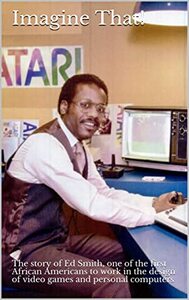Take a photo of a barcode or cover
Before I heard about this book I had no idea who Ed Smith is or what the Imagination Machine is. The first portion of the books reads like a conversation Ed is having with you about his youth in Brownsville, jumping around from anecdotes about friends and family. As the books gets more into his career it becomes more linear, and easier to understand the timeline. Both formats feel good, but the first part left me a little confused about when things where happening in his life. There are some technical descriptions of computers and technology that are hard to follow for a layman, but the story of Ed Smith is interesting and easy enough to follow. If you're interested in video game history or African American history (which is American history) this is worth checking out.
First of all, thank you Benj Edwards for helping get this story out here. I would never have known about Ed Smith otherwise. I appreciate your articles and tweets that educate me about the early years of one of my hobbies and favorite fields.
Second, there was some cool stuff going on in the late 70s/early 80s computing of which I am still largely ignorant, and I am happy to have learned a bit about the MP1000 and the IM1 in this book, when I knew nothing about them before. There was some really cool things done in the development and marketing. Just because it failed as the industry switched from cassette to floppy disks doesn't mean the people who worked on it were bad at their jobs. I found that to be a valuable lesson to take with me. I found Ed's insights into the industry and how to be a good manager and a good employee to be reminders of how we can work to be better people.
Third, this book needs editing. Badly. The first half meanders and rambles like we're sitting down and Ed is just reminiscing about his early life, with tangents as friends and mentors show up that don't add to the story at hand. It could be reworked and made tighter and more compelling. If the friend has a later development in life, maybe we could slide that that in when we reach that point in time later in the book. The second half is more straightforward as we move through his career and accomplishments. However I noticed several copy edits that needed caught in the latter half.
This book deserves a 4 star rating for telling the story of an African American pioneer in the computing industry, and for the humility and grace with which he describes his lucky breaks and the way to move your own career forward and up - some of the advice feels a little dated as we move more fully into the gig economy, but most of the principles about leveraging who you know and how to build your own skills still apply. This book deserves a 2 star or even 1 star rating for editing, it needs a lot of work to become a more compelling story and clean up the copy edit misses. So I am averaging it to a 3.
Second, there was some cool stuff going on in the late 70s/early 80s computing of which I am still largely ignorant, and I am happy to have learned a bit about the MP1000 and the IM1 in this book, when I knew nothing about them before. There was some really cool things done in the development and marketing. Just because it failed as the industry switched from cassette to floppy disks doesn't mean the people who worked on it were bad at their jobs. I found that to be a valuable lesson to take with me. I found Ed's insights into the industry and how to be a good manager and a good employee to be reminders of how we can work to be better people.
Third, this book needs editing. Badly. The first half meanders and rambles like we're sitting down and Ed is just reminiscing about his early life, with tangents as friends and mentors show up that don't add to the story at hand. It could be reworked and made tighter and more compelling. If the friend has a later development in life, maybe we could slide that that in when we reach that point in time later in the book. The second half is more straightforward as we move through his career and accomplishments. However I noticed several copy edits that needed caught in the latter half.
This book deserves a 4 star rating for telling the story of an African American pioneer in the computing industry, and for the humility and grace with which he describes his lucky breaks and the way to move your own career forward and up - some of the advice feels a little dated as we move more fully into the gig economy, but most of the principles about leveraging who you know and how to build your own skills still apply. This book deserves a 2 star or even 1 star rating for editing, it needs a lot of work to become a more compelling story and clean up the copy edit misses. So I am averaging it to a 3.
